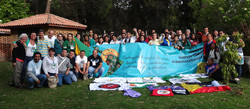
The organizations that were called to participate in the consultation criticized the concept of responsible agriculture, by comparing it with Corporate Social Responsibility, through which some corporations seek to mitigate or greenwash the impacts of their policies on the communities.
We do not believe in responsible agriculture investment
A continental consultation to discuss the concept of "responsible agriculture investment" developed by the Committee on World Food Security took place in Bogota, Colombia on August 7 and 8.
Several questions were raised at the event, such as: Are “responsible” investments those that profit from territories? Should FAO (Food and Agriculture Organization) member states legitimate land grabbing or the appropriation of water sources through a “certificate” of responsibility? What are the necessary public resources policies to achieve rural development?
The starting point for the meeting was the regional situation in terms of large-scale agriculture megaprojects that displace peasants and native peoples; large hydroelectric dams that submerge ancient peoples; or transnational corporations that flood the region with their genetically modified (GM) seeds that harm its biodiversity.
The organizations that were called to participate in the consultation by their representatives before the Civil Society’s Mechanism that is part of the Committee on World Food Security criticized the concept of responsible agriculture, by comparing it with Corporate Social Responsibility, through which some corporations seek to mitigate or greenwash the impacts of their policies on the communities.
Valter Da Silva of the Latin American Coordination of Countryside Organizations (CLOC-Via Campesina) said that behind the so called “responsible” investments there is a criminalization of native and peasant seed production because they threaten the corporate monopolies. He said that public investment policies are needed to promote the production of this kind of seeds.
Da Silva highlighted the importance of talking about the principles that, in his opinion, the organizations advocating for food sovereignty should follow. Although he was skeptical as to the level of support that these policies could have within the FAO as global policies that would force states to protect peasant farming.
Meanwhile, Javier Rivera, a peasant and coordinator of the Agroecological Movement of Latin America and the Caribbean (MAELA) of the Tulua region in Valle del Cauca, Colombia, said that in the Andean region the concept of responsibility has been an excuse to get international cooperation funds that rarely reach the communities.
He said the newly created Alliance for Food Sovereignty should have input and tools “so that the grassroots are able to confront these policies and investments”, which in the case of Colombia have been used to displace peasants and replace food production with agribusiness, including agrofuel production.
The Alliance for Food Sovereignty has several representatives in the Andean region at the Civil Society Mechanism that will bring before the FAO the principles that come out of the meeting, as well as the definitions resulting from the consultation scheduled for October













